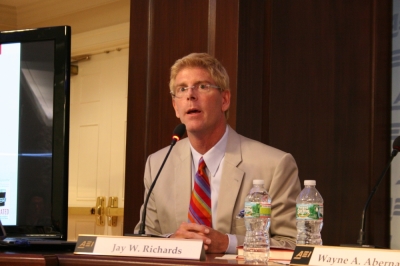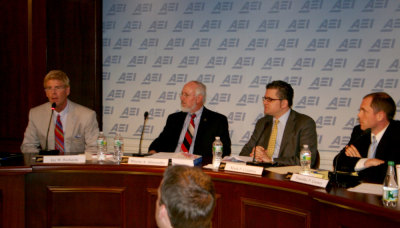Christian Scholar: Financial Crisis Caused by 'Cronyism' More Than Greed

WASHINGTON – Apologist, scholar, and intelligent design advocate Jay Richards presented his new book, Infiltrated: How to Stop the Insiders and Activists Who are Exploiting the Financial Crisis to Control Our Lives and Our Fortunes, on Thursday at the American Enterprise Institute, arguing that the 2008 financial crisis stemmed from "full spectrum cronyism," the collusion of big business and big government, rather than Wall Street greed.
"Saying that greed caused the financial crisis is like saying gravity caused a plane crash," Richards said. Citing greed, he explained, brings up a "constant" general problem, but fails to account for the real reasons behind the financial meltdown, shown by the "variables" involved.
The established wisdom about the crisis, the apologist noted, is that it was caused by unfettered competition. But, as in the subtitle of his first book, Money, Greed, and God, Richards argued that capitalism is the solution, not the problem. Having recently become a visiting scholar at the Institute for Faith, Work, and Economics, which ties Christianity to wealth creation, he devoted an entire chapter of his book to the Christian debate over usury, the practice of money-lending.
Rather than a few abstract Wall Street bankers, the true culprits are all around us, Richards alleged. For-profit and non-profit businesses, media, and the government each played a role. The book narrates the stories of the rich who marketed dangerous loans to those with low credit scores, and the non-profit and government policies promoting them.
"I argue that many sort of well-meaning people with good intentions advocated a particular set of policies that led to some very bad consequences and then some of those people actually used the bad consequences as a pretense to increase their own power," the scholar explained.
The book details the stories of investors Herbert and Marion Sandler, who marketed "risky, non-traditional loans" to debtors with "sub-prime" credit scores. Option Adjustable Rate Mortgage (ARM) loans allowed debtors to choose to pay less than the interest on their loans, and fall further and further into debt. In 2006, the Sandlers sold their company to Wachovia Bank, which crashed in 2008.
The business power couple donated to great causes, but also used philanthropic gifts to groups like ACORN to target their competitor, Wells Fargo, Richards argued. They also funded non-profit organizations Self Help and the Center for Responsible Lending, which advocated for non-traditional loans.
The Sandlers set up Pro-Publica, which funds investigative journalism – journalism which featured positive stories on Herbert and Marion Sandler during the 2008 crisis, the apologist alleged.

Due to the advocacy of non-profits like Self Help and the Center for Responsible Lending, the federal government mandated lower standards for loans, which "changed the market incentives," confusing investors and fueling the crisis.
Following the crisis, the Dodd-Frank Wall Street Reform and Consumer Protection Act created the Consumer Financial Protection Bureau (CFPB), "a sovereign entity with jurisdiction over all finance," Richards explained. He warned that the organization's power verges on the "creeping soft tyranny" that promises security but destroys freedom, that was warned about by French historian Alexis de Tocqueville.
Wayne Abernathy, executive vice president for financial institutions policy and regulatory affairs at the American Bankers Association, who was part of four-persons panel, agreed with Richards about the dangers of the CFPB. "The more discretion you give to government, the more you create the opportunity for misuse of that discretion for private gain," he contended.
Abernathy argued that Richard's book clearly showcases the damage resulting from people harnessing government power "to enforce their personal views of benevolence." He quoted New York Congressman William Bourke Cockran, who said "that government only is good, that government only is great, that government only is just, which has neither favorites nor victims."
Mark A. Calabria, director of financial regulation studies at the Cato Institute in Washington, D.C., praised Infiltrated as accessible, entertaining, and insightful, but argued that it left out a great deal of the financial crisis, only focusing on a few of the 12 policies behind the meltdown. Nevertheless, the book achieved a unique feat – "both scholarly and journalistic," it may have a "weak flow," but brings "great, strong, and pertinent points," he said.





















